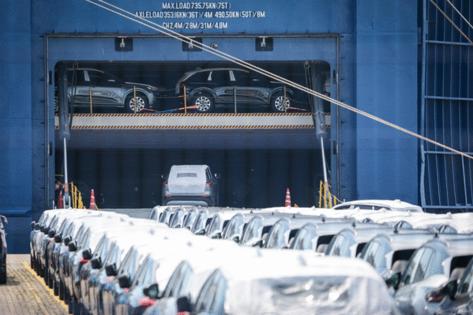US cuts tariffs on EU Cars to 15%, cementing trade terms
Published in Business News
The U.S. lowered tariffs on auto imports from the European Union to 15% retroactive to Aug. 1, cementing terms of the framework trade agreement the two sides struck almost two months ago.
The Department of Commerce and Office of the U.S. Trade Representative published a document online on Wednesday detailing the changes, reducing duties on a range of goods.
The order will help to further ease tensions between Washington and Brussels, as the two sides work through implementing the details of the trade deal they announced at one of President Donald Trump’s golf courses in Scotland.
The formality of the Federal Register filing will be especially welcome news for Europe’s auto industry, which has been waiting for several weeks for the lower duties to be adopted.
Shares of German carmakers Volkswagen AG, Porsche AG and Mercedes-Benz Group AG gained on the news. Porsche, which is among the hardest hit by the U.S. tariffs as it sells only imports there, rose as much as 3.8% in Frankfurt.
The changes laid out in the filing include a list of exemptions for sectors including aircraft, aircraft parts and generic pharmaceutical drugs plus ingredients, as well as “unavailable natural resources” such as cork and certain metals and ores, effective Sept. 1. Those goods will maintain lower so-called most favored nation, or MFN, rates.
Most of the new rates take effect for EU goods shipped starting Sept. 1, but the relief for automobiles and parts was contingent on the EU introducing legislation to lower tariffs on American industrial goods and some non-sensitive agricultural products.
The bloc followed through with that action on Aug. 28 and is currently in the process of implementing its concessions, paving the way for the Trump administration to backdate the new auto charge.
Previously, those vehicles faced a 25% U.S. duty on top of prior levies of 2.5%.
As part of the arrangements in the trade deal, the EU faces a 15% tariff ceiling on most of its exports. That rate doesn’t stack on top of any existing industry-specific tariffs, and the EU expects it to also cover any future sectoral levies that may be introduced on drugs and chips.
However, the two sides have yet to make much progress on reaching an accord to lower tariffs on steel and aluminum, where the bloc is currently facing 50% duties on its exports.
Other goods already subject to tariffs above 15% under MFN arrangements will continue to be taxed at those higher levels.
The U.S. said in its notice that the list of products may yet be amended. The move followed an executive order that Trump signed earlier this month that smoothed the process for his administration to adjust tariff rates for imports from economies with which he struck trade pacts.
(With assistance from Stefan Nicola and Max Ramsay.)
©2025 Bloomberg L.P. Visit bloomberg.com. Distributed by Tribune Content Agency, LLC.












Comments